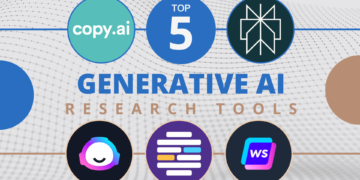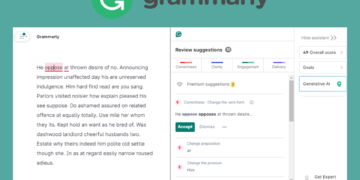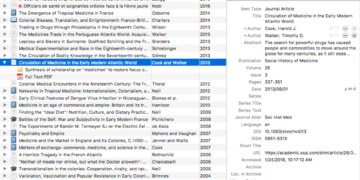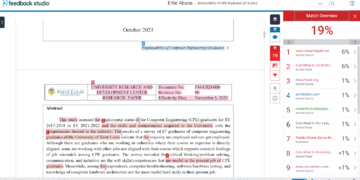In today’s fast-paced academic landscape, the world of research is undergoing a profound transformation, largely driven by advancements in artificial intelligence. As researchers face increasing demands for efficiency and productivity, AI tools have emerged as invaluable assets, revolutionizing how academic tasks are approached and executed. These cutting-edge tools are not only streamlining time-consuming processes but also enhancing the quality and depth of research outputs.
Generative AI, in particular, has made significant strides in supporting researchers by automating and optimizing various aspects of the research workflow. From crafting well-structured text to condensing complex information into concise summaries, these tools offer a range of functionalities that can dramatically improve research efficiency. Additionally, they provide valuable insights and recommendations that can guide researchers in exploring new avenues and refining their studies.
In this article, we explore five innovative generative AI tools designed to assist researchers in their quest for knowledge. These tools are engineered to generate high-quality text, simplify the summarization of extensive research documents, and deliver actionable insights that can elevate the research process. By integrating these AI-driven solutions, researchers can not only accelerate their work but also enhance the overall quality and impact of their research contributions.
Here’s a closer look at these five generative AI tools for academic research and how they can transform the way you approach your research endeavors.
Website: Perplexity
Perplexity is a free AI tool for academic research designed to assist researchers by generating and refining academic content, answering complex questions, and providing insightful summaries. Leveraging advanced natural language processing technology, Perplexity offers a range of features that enhance research efficiency and productivity, making it a valuable resource for academics across various disciplines.
Key Features:
- Contextual Answering: Perplexity excels in providing detailed and contextually relevant answers to a wide range of research questions. By analyzing input queries, the tool generates responses that help clarify complex topics, provide explanations, and offer insights based on the latest research and knowledge.
- Content Generation: Researchers can use Perplexity to generate high-quality text for various academic purposes. This includes drafting research papers, creating outlines, and developing summaries. The tool’s ability to produce coherent and well-structured content helps streamline the writing process and improve overall productivity.
- Summarization: Perplexity offers powerful summarization capabilities, condensing lengthy research articles, papers, and reports into concise and comprehensible summaries. This feature is particularly useful for quickly grasping key findings and main points from extensive documents.
- Research Assistance: The tool assists in gathering and synthesizing information from multiple sources. By providing relevant insights and recommendations, Perplexity supports researchers in conducting literature reviews, identifying trends, and exploring new areas of inquiry.
- User-Friendly Interface: Perplexity features an intuitive interface that simplifies the process of querying and receiving responses. The ease of use ensures that researchers can efficiently interact with the tool and access the information they need without extensive training or technical knowledge.
Benefits for Researchers
Perplexity enhances the research process by offering a comprehensive suite of AI-driven features that facilitate content generation, question answering, and information summarization. Its free access makes it an attractive option for researchers looking to leverage advanced AI technology without additional costs. By integrating Perplexity into their workflow, researchers can streamline the drafting of academic content, quickly understand complex topics, and efficiently synthesize information from diverse sources.
Overall, Perplexity serves as a valuable tool for improving research efficiency and quality, providing support across various stages of the research process and helping researchers achieve more impactful outcomes.rch methods. This tool helps streamline the research process, ultimately leading to more thorough and informed academic work.
Website: Copy.ai
Copy.ai is an innovative tool that harnesses the power of artificial intelligence to streamline and enhance the process of writing. Tailored to meet the needs of researchers, Copy.ai offers a range of features designed to expedite the creation of high-quality academic content. Whether you need to draft abstracts, summarize lengthy research papers, prepare research proposals, or handle collaborative communication, Copy.ai simplifies these tasks with impressive efficiency and accuracy.
Key Features
- AI-Powered Content Generation: At its core, Copy.ai utilizes advanced AI algorithms to generate text that is not only contextually relevant but also engaging and coherent. This capability ensures that the content produced is both high-quality and aligned with academic standards.
- Abstract and Summary Creation: Researchers often need to condense complex information into concise abstracts or summaries. Copy.ai automates this process, providing well-structured and easily comprehensible summaries that capture the essence of your research work.
- Research Proposal Drafting: Crafting compelling research proposals can be time-consuming. Copy.ai helps streamline this task by generating well-organized proposal drafts that include key components such as objectives, methodology, and expected outcomes, allowing you to focus on refining your research ideas.
- Email and Communication Assistance: Effective communication is crucial for collaboration and networking in academia. Copy.ai assists in drafting clear, professional emails and other forms of correspondence, ensuring that your interactions with colleagues, reviewers, and collaborators are polished and impactful.
- User-Friendly Interface: Designed with ease of use in mind, Copy.ai features an intuitive interface that allows users to quickly access and utilize its diverse functionalities. The platform is designed to accommodate both novice and experienced users, making it a versatile tool for all levels of academic writing.
Benefits for Researchers
By integrating Copy.ai into your research workflow, you can significantly reduce the time spent on routine writing tasks. The AI-driven content generation not only speeds up the process but also enhances the quality of your written outputs. This allows you to dedicate more time to conducting research and analyzing results, rather than being bogged down by the intricacies of writing and editing.
Whether you’re drafting initial research documents or finalizing polished manuscripts, Copy.ai serves as a powerful assistant in the research writing process, helping you achieve greater efficiency and productivity.
Website: Jasper
Jasper is a highly adaptable AI writing assistant that excels in generating a broad spectrum of content, tailored to meet the diverse needs of researchers. Originally known as Jarvis, Jasper offers an advanced set of tools designed to facilitate the creation of both creative and technical documents. Its ability to produce research summaries, literature reviews, and draft sections of research papers makes it an invaluable asset for researchers looking to enhance their productivity and efficiency.
Key Features
- Research Summary Generation: Jasper streamlines the process of summarizing complex research papers and studies. By inputting key details or sections of your research, Jasper can generate concise and coherent summaries that highlight the main findings and contributions of your work, making it easier to communicate your research to a broader audience.
- Literature Review Assistance: Crafting a comprehensive literature review can be one of the most time-consuming aspects of academic writing. Jasper aids in this process by generating well-organized reviews based on the latest research, helping you to synthesize existing literature and identify key themes, gaps, and trends relevant to your study.
- Flexible Content Formats: Whether you’re working on a research paper, preparing a presentation, or drafting an article for publication, Jasper supports a variety of content formats. This flexibility ensures that you can create content that meets the specific requirements of different academic and professional contexts, from detailed reports to brief summaries.
- Creative and Technical Content Support: Jasper is designed to handle both creative and technical writing tasks. This dual capability is particularly useful for researchers who need to produce technical reports, theoretical papers, or even engaging blog posts about their research findings. Jasper’s AI is adept at understanding and generating content across various writing styles and disciplines.
- Customizable User Prompts: One of Jasper’s standout features is its ability to work with customizable prompts. You can tailor the AI’s responses by providing specific instructions or context, ensuring that the generated content aligns closely with your research objectives and personal writing style. This adaptability allows for more precise and relevant outputs.
Benefits for Researchers
By leveraging Jasper, researchers can significantly streamline the writing process, from drafting initial papers to preparing final publications. Jasper’s ability to produce high-quality content across various formats and styles not only saves time but also enhances the clarity and impact of your written work. Its versatile features make it a valuable tool for generating research summaries, conducting literature reviews, and developing comprehensive research papers, all while maintaining flexibility to accommodate different writing needs and preferences.
With Jasper, researchers can focus more on the intellectual aspects of their work and less on the labor-intensive tasks of writing and editing, thereby increasing overall productivity and output quality.
Website: Writesonic
Writesonic is a robust AI writing tool designed to assist researchers in creating high-quality, well-structured content efficiently. Leveraging advanced AI technology, Writesonic excels in generating research summaries, articles, and reports, making it an essential tool for academics who need to produce polished and impactful written material. Its ability to work from brief descriptions or keywords ensures that the content is both relevant and engaging, catering to various needs within the research process.
Key Features
- Research Summary Generation: Writesonic simplifies the task of condensing detailed research findings into clear, concise summaries. By inputting essential details or key points, researchers can quickly generate summaries that effectively communicate the core contributions and insights of their work, making it easier to share results with a broader audience.
- Article and Report Writing: Whether you’re preparing an article for publication or drafting a comprehensive research report, Writesonic provides support throughout the writing process. The AI generates coherent and well-organized text, ensuring that your documents are professionally written and meet academic standards. This feature is particularly useful for producing lengthy or detailed documents efficiently.
- Keyword-Based Content Creation: Writesonic’s keyword-based approach allows researchers to generate content that aligns with specific topics or themes. By entering relevant keywords or phrases, you can direct the AI to produce content that is tailored to your research focus, ensuring that the generated text is directly applicable to your needs and research objectives.
- Introduction and Conclusion Crafting: Crafting compelling introductions and conclusions is crucial for making a strong impact with your research papers. Writesonic helps by generating engaging and well-structured opening and closing sections, enhancing the readability and overall quality of your research documents. This feature ensures that your papers are not only informative but also captivating to your readers.
- High-Quality Content Output: Writesonic is designed to deliver high-quality content that meets professional and academic standards. The AI’s advanced algorithms ensure that the text produced is grammatically correct, well-organized, and relevant to your research goals. This commitment to quality helps researchers present their findings in the best possible light.
Benefits for Researchers
Writesonic significantly accelerates the writing process by providing well-crafted content based on minimal input. This efficiency is invaluable for researchers who need to produce high-quality summaries, articles, and reports quickly. By handling routine writing tasks, Writesonic allows researchers to focus on the more critical aspects of their work, such as data analysis and interpretation. Its capability to generate engaging introductions and conclusions further enhances the impact of your research papers, making them more compelling and accessible.
Overall, Writesonic serves as a powerful tool for streamlining academic writing tasks, improving content quality, and ensuring that your research findings are communicated effectively and professionally.
Website: Scholarcy
Scholarcy is a cutting-edge AI-powered tool designed to streamline the research process by efficiently summarizing and distilling complex academic papers and articles. With its advanced algorithms, Scholarcy reads through lengthy research documents and extracts crucial information, making it an invaluable resource for researchers who need to quickly grasp the essence of extensive literature. By providing concise and well-organized summaries, Scholarcy helps researchers save time and focus on in-depth analysis and synthesis of the material.
Key Features
- Automated Research Paper Summaries: Scholarcy automates the summarization of research papers, transforming extensive documents into easily digestible summaries. This feature is particularly beneficial for researchers who need to review multiple papers quickly, as it eliminates the need to read through each document in its entirety.
- Key Information Extraction: The tool excels at extracting critical information from research papers, such as objectives, methods, results, and conclusions. By highlighting these key elements, Scholarcy ensures that researchers can quickly access the most relevant data without wading through pages of text.
- Highlighting of Important Findings: Scholarcy identifies and highlights the most significant findings and insights within a research paper. This feature helps researchers pinpoint crucial discoveries and contributions, facilitating a more efficient review process and aiding in the synthesis of new knowledge.
- Concise Summary Generation: The AI generates summaries that are not only concise but also well-structured, capturing the core messages and contributions of the research. These summaries are designed to be clear and coherent, making it easier for researchers to understand the main points without being overwhelmed by the details.
- Time-Saving for Researchers: By providing quick access to essential information and streamlined summaries, Scholarcy significantly reduces the time required to review and analyze research papers. This allows researchers to dedicate more time to critical tasks such as data analysis, hypothesis development, and writing.
Benefits for Researchers
Scholarcy enhances the efficiency of the research process by offering a rapid and effective way to understand and organize large volumes of academic literature. Researchers can benefit from its automated summarization and key information extraction features, which facilitate a quicker review of relevant papers and articles. This time-saving tool is ideal for those who need to stay abreast of the latest developments without being bogged down by lengthy readings.
In addition to its summarization capabilities, Scholarcy’s ability to highlight important findings ensures that researchers can easily identify and focus on significant contributions within their field. Overall, Scholarcy helps streamline the research workflow, allowing researchers to spend less time on preliminary reviews and more time on meaningful analysis and application of their findings.





































